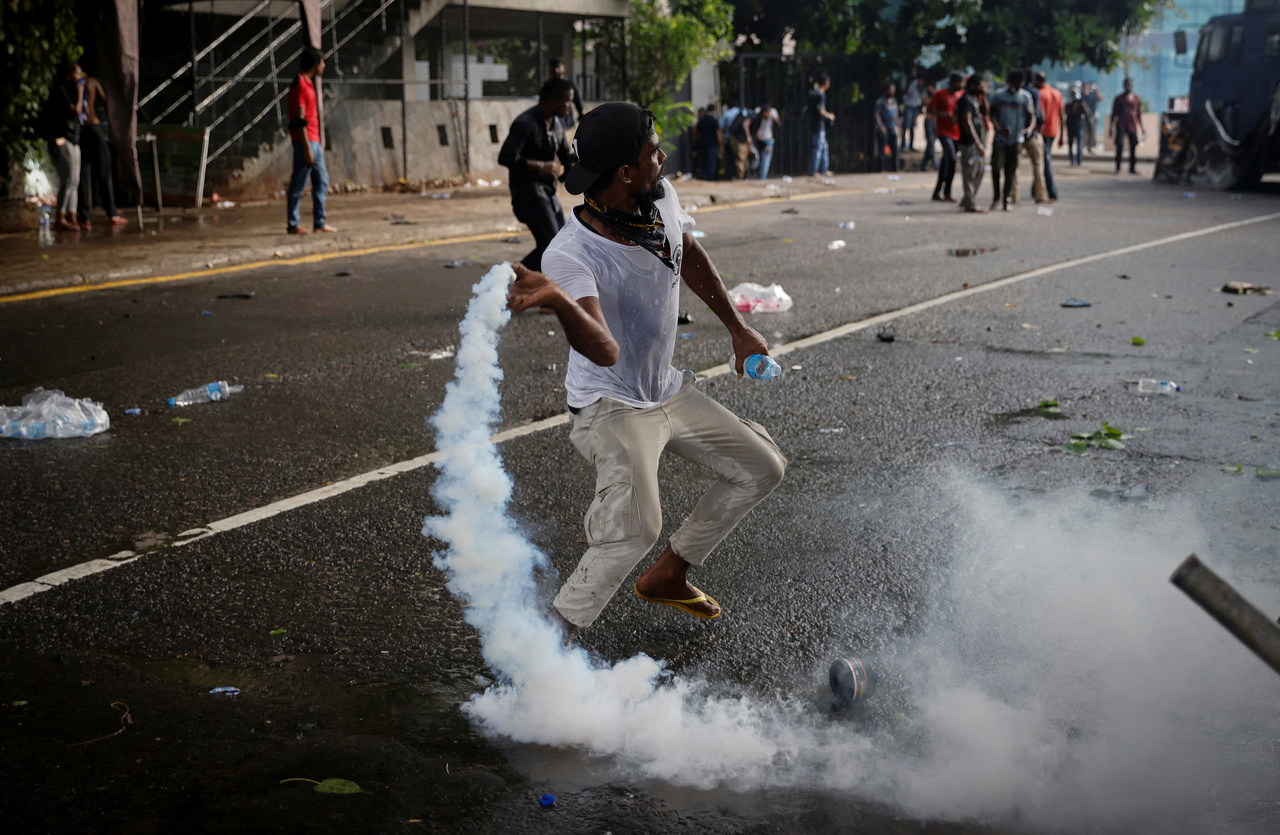The Asian Voice
How is Sri Lanka's youth dealing with the economic crisis?: Daily Star contributor
The writers say the spirit of the Sri Lankan youth still seems to be strong and unwavering despite the circumstances.
Sign up now: Get insights on Asia's fast-moving developments

A protestor throws back a tear gas canister towards the police during a protest in Colombo on May 19, 2022.
PHOTO: REUTERS
DHAKA (THE DAILY STAR/ASIA NEWS NETWORK) - We've been talking to a black screen for over an hour now. Paramie Jayakody, a Colombo-based journalist, is on the other end of the call.
We haven't been able to actually see each other yet, but with the wavering internet connection and frequent power outages she's been facing, having to keep her video switched off is the least of her concerns.
"People have switched over to only one meal a day because they just can't afford it," Paramie says. Not only does this reduce the amount they need to spend on the exorbitantly priced food supplies in Sri Lanka, but it also helps them avoid waking up at odd hours to prepare meals due to the inconsistent power supply.
Life revolves around these power cuts, with no escape from the brutal summer heat. Even travelling beyond a radius of three kilometres proves to be taxing, as one either needs to stand in extremely long fuel queues or shell out for the increased public transport fare.
With the economic crisis in Sri Lanka fuelling these deplorable conditions, a widespread protest movement has emerged across the island nation. The target of these protests is the ruling party-particularly President Gotabaya Rajapaksa.
From our interactions with Sri Lankans, it appears that they are unwilling to forgive the president and believe any reform will take place only after all the Rajapaksas are stripped of their powers. As Sahan, a 27-year-old protester from Colombo, elaborates, "Other countries have funded Sri Lanka, and we have internal bonds piling up to be released in emergencies, but they are living a luxurious lifestyle, built on this and taxpayers' money."
Prime Minister Mahinda Rajapaksa, the president's brother, has already been forced to step down, but the president himself overcame a no-confidence motion put forth by the opposition. The appointment of the new prime minister, Ranil Wickremesinghe, has been considered a victory by many Sri Lankans.
However, according to Paramie, a lot of protesters are also perceiving it as a "way to ignore the people's primary demand that the president must resign." The transparency shown by the new prime minister with regard to the economic crisis, the solutions he has offered, such as privatising the Sri Lankan airlines, as well as his international ties have led to him gaining mainstream public support.
But his appointment is also viewed by his critics as a mutually beneficial relationship of power and protection, which further adds to the uncertainty. Due to this uncertainty, many protesters have not surrendered their original demands.
The long-drawn-out quest to make the president resign has taken numerous forms. Perhaps the most notable one is GoGotaGama (Go Gota Village), a protest site right in the heart of Colombo. The vibrance of the village is evident through the sheer number of participants, estimated by Sahan to be at least 100,000 at any given point in time.
Although most small businesses can't openly support the protests, many of them, such as local bakeries, help out in whatever way they can. Another iteration of the village, HoruGoGama (Thieves Go Village), has been set up directly in front of the parliament.
However, the sheer strength of the protests does not seem to have daunted the government. On May 9, supporters of the ruling party attacked GoGotaGama, triggering a wave of violent clashes across the country. Paramie recalled the police doing nothing and simply watching as the mob entered barricaded areas and attacked women and children, forcing men to abandon tents which were then set on fire. Huge parts of the protest site were destroyed, and although the protesters managed to recover a few tents, most of the creative displays were demolished.
But despite the curfew that was imposed, people are rebuilding the village. The site was in complete disarray when Paramie reached it, and she realised a lot of supplies were required, so she got together with a few friends and found many people willing to donate for the cause. It took around half a day for people to just try and understand what was needed at the site, and by the time they left to procure the supplies, others were offering aid, donating resources, and putting up tents. Now, Paramie and her friends regularly visit the protest site, and activities such as poetry readings have slowly gone back to normal.
Authority errs when it underestimates the power of the people and tries to suppress legitimate protests. This is quite evident in Sri Lanka today. Despite the lack of adequate response from the ruling party, and the increasing contempt they seem to show towards citizens in these desperate situations, the spirit of the Sri Lankan youth still seems to be strong and unwavering.
- Adnan Abbasi, Tejashree Murugan and Vaishnavi Chandrasekar are writing fellows with the Fellowship for Freedom in India. The Daily Star is a member of The Straits Times media partner Asia News Network, an alliance of 23 news media organisations.


